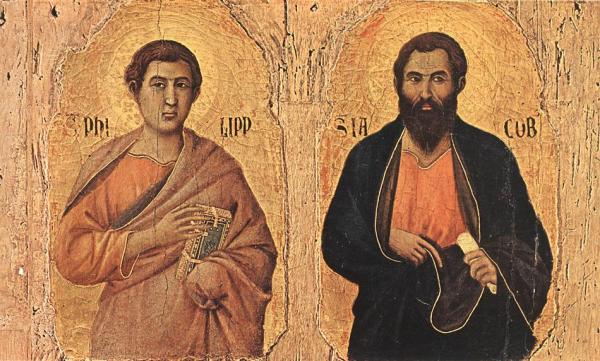
Deuteronomy 15:1–11 (Listen)
The Sabbatical Year
15:1 “At the end of every seven years you shall grant a release. 2 And this is the manner of the release: every creditor shall release what he has lent to his neighbor. He shall not exact it of his neighbor, his brother, because the LORD’s release has been proclaimed. 3 Of a foreigner you may exact it, but whatever of yours is with your brother your hand shall release. 4 But there will be no poor among you; for the LORD will bless you in the land that the LORD your God is giving you for an inheritance to possess—5 if only you will strictly obey the voice of the LORD your God, being careful to do all this commandment that I command you today. 6 For the LORD your God will bless you, as he promised you, and you shall lend to many nations, but you shall not borrow, and you shall rule over many nations, but they shall not rule over you.
7 “If among you, one of your brothers should become poor, in any of your towns within your land that the LORD your God is giving you, you shall not harden your heart or shut your hand against your poor brother, 8 but you shall open your hand to him and lend him sufficient for his need, whatever it may be. 9 Take care lest there be an unworthy thought in your heart and you say, ‘The seventh year, the year of release is near,’ and your eye look grudgingly on your poor brother, and you give him nothing, and he cry to the LORD against you, and you be guilty of sin. 10 You shall give to him freely, and your heart shall not be grudging when you give to him, because for this the LORD your God will bless you in all your work and in all that you undertake. 11 For there will never cease to be poor in the land. Therefore I command you, ‘You shall open wide your hand to your brother, to the needy and to the poor, in your land.’
1 Timothy 3:14–4:5 (Listen)
The Mystery of Godliness
14 I hope to come to you soon, but I am writing these things to you so that, 15 if I delay, you may know how one ought to behave in the household of God, which is the church of the living God, a pillar and buttress of the truth. 16 Great indeed, we confess, is the mystery of godliness:
He was manifested in the flesh,
vindicated by the Spirit,
seen by angels,
proclaimed among the nations,
believed on in the world,
taken up in glory.
Some Will Depart from the Faith
4:1 Now the Spirit expressly says that in later times some will depart from the faith by devoting themselves to deceitful spirits and teachings of demons, 2 through the insincerity of liars whose consciences are seared, 3 who forbid marriage and require abstinence from foods that God created to be received with thanksgiving by those who believe and know the truth. 4 For everything created by God is good, and nothing is to be rejected if it is received with thanksgiving, 5 for it is made holy by the word of God and prayer.
Matthew 13:24–34 (Listen)
The Parable of the Weeds
24 He put another parable before them, saying, “The kingdom of heaven may be compared to a man who sowed good seed in his field, 25 but while his men were sleeping, his enemy came and sowed weeds among the wheat and went away. 26 So when the plants came up and bore grain, then the weeds appeared also. 27 And the servants of the master of the house came and said to him, ‘Master, did you not sow good seed in your field? How then does it have weeds?’ 28 He said to them, ‘An enemy has done this.’ So the servants said to him, ‘Then do you want us to go and gather them?’ 29 But he said, ‘No, lest in gathering the weeds you root up the wheat along with them. 30 Let both grow together until the harvest, and at harvest time I will tell the reapers, “Gather the weeds first and bind them in bundles to be burned, but gather the wheat into my barn.”’”
The Mustard Seed and the Leaven
31 He put another parable before them, saying, “The kingdom of heaven is like a grain of mustard seed that a man took and sowed in his field. 32 It is the smallest of all seeds, but when it has grown it is larger than all the garden plants and becomes a tree, so that the birds of the air come and make nests in its branches.”
33 He told them another parable. “The kingdom of heaven is like leaven that a woman took and hid in three measures of flour, till it was all leavened.”
Prophecy and Parables
34 All these things Jesus said to the crowds in parables; indeed, he said nothing to them without a parable.
Morning Psalms
Psalm 93 (Listen)
The Lord Reigns
93:1 The LORD reigns; he is robed in majesty;
the LORD is robed; he has put on strength as his belt.
Yes, the world is established; it shall never be moved.
2 Your throne is established from of old;
you are from everlasting.
3 The floods have lifted up, O LORD,
the floods have lifted up their voice;
the floods lift up their roaring.
4 Mightier than the thunders of many waters,
mightier than the waves of the sea,
the LORD on high is mighty!
5 Your decrees are very trustworthy;
holiness befits your house,
O LORD, forevermore.
Psalm 150 (Listen)
Let Everything Praise the Lord
150:1 Praise the LORD!
Praise God in his sanctuary;
praise him in his mighty heavens!
2 Praise him for his mighty deeds;
praise him according to his excellent greatness!
3 Praise him with trumpet sound;
praise him with lute and harp!
4 Praise him with tambourine and dance;
praise him with strings and pipe!
5 Praise him with sounding cymbals;
praise him with loud clashing cymbals!
6 Let everything that has breath praise the LORD!
Praise the LORD!
Evening Psalms
Psalm 136 (Listen)
His Steadfast Love Endures Forever
136:1 Give thanks to the LORD, for he is good,
for his steadfast love endures forever.
2 Give thanks to the God of gods,
for his steadfast love endures forever.
3 Give thanks to the Lord of lords,
for his steadfast love endures forever;
4 to him who alone does great wonders,
for his steadfast love endures forever;
5 to him who by understanding made the heavens,
for his steadfast love endures forever;
6 to him who spread out the earth above the waters,
for his steadfast love endures forever;
7 to him who made the great lights,
for his steadfast love endures forever;
8 the sun to rule over the day,
for his steadfast love endures forever;
9 the moon and stars to rule over the night,
for his steadfast love endures forever;
10 to him who struck down the firstborn of Egypt,
for his steadfast love endures forever;
11 and brought Israel out from among them,
for his steadfast love endures forever;
12 with a strong hand and an outstretched arm,
for his steadfast love endures forever;
13 to him who divided the Red Sea in two,
for his steadfast love endures forever;
14 and made Israel pass through the midst of it,
for his steadfast love endures forever;
15 but overthrew Pharaoh and his host in the Red Sea,
for his steadfast love endures forever;
16 to him who led his people through the wilderness,
for his steadfast love endures forever;
17 to him who struck down great kings,
for his steadfast love endures forever;
18 and killed mighty kings,
for his steadfast love endures forever;
19 Sihon, king of the Amorites,
for his steadfast love endures forever;
20 and Og, king of Bashan,
for his steadfast love endures forever;
21 and gave their land as a heritage,
for his steadfast love endures forever;
22 a heritage to Israel his servant,
for his steadfast love endures forever.
23 It is he who remembered us in our low estate,
for his steadfast love endures forever;
24 and rescued us from our foes,
for his steadfast love endures forever;
25 he who gives food to all flesh,
for his steadfast love endures forever.
26 Give thanks to the God of heaven,
for his steadfast love endures forever.
Psalm 117 (Listen)
The Lord’s Faithfulness Endures Forever
117:1 Praise the LORD, all nations!
Extol him, all peoples!
2 For great is his steadfast love toward us,
and the faithfulness of the LORD endures forever.
Praise the LORD!
St. Philip and St. James, Apostles (May 1)

About the Festival
The Fourth Gospel provides what information we have about Philip. He was born in Bethsaida, the same fishing village on the shores of Galilee from which Peter and Andrew came. He was among the first disciples, who, after Jesus found him, found Nathanael (sometimes identified with Bartholomew; see August 24) and brought him to Jesus (John 1:43-51). Apart from his own calling, the story of Nathanael, and his inclusion in the lists of the apostles, the only other incidents of Philip’s life recorded in the Gospels are the time Jesus asked Philip how they would be able to feed the crowds (John 6:5-7), the occasion when some Greeks came to him (Philip is a Greek name) to ask his help in arranging an interview with Jesus (John 12:20-22), and his role in one of Jesus’ major discourses (John 14:8-9).
According to tradition, Philip, after Pentecost, went first to Scythia on the north coast of the Black Sea to preach the gospel, where he was remarkably successful, and then to Phrygia (in modern Turkey), where he remained until his death. He is said to have met his death in the town of Hierapolis in Phrygia, according to some accounts by crucifixion and stoning. Traditions also tell of Philip’s two unmarried daughters who survived him, lived to an old age, and were also buried in Hierapolis.
Philip the Apostle is represented in iconography by a Latin or sometimes a Tau cross, an emblem of his crucifixion, and two loaves of bread, recalling the miracle of the feeding of the five thousand (John 6:5-6).
Philip the Apostle is not to be confused with the Philip who with Stephen was a deacon in the Jerusalem church (Acts 6:5) and who is sometimes called Philip the Evangelist (see October 11).
James the son of Alphaeus is usually called James the Less (meaning either “short” or “younger”; the title derives from Mark 15:40) to distinguish him from James the Elder, the brother of John, who is commemorated July 25, and from James of Jerusalem, the brother of the Lord, who is commemorated October 2?. The only certain reference to James the Less in Scripture is the inclusion of his name in the apostolic lists. James the son of Alphaeus may be the James whose mother Mary was one of those present at the crucifixion (Matt 27:53-56 and Mark 15:40) and who had a brother named Joseph or, in the Greek form of the name, Joses.
The iconographical symbol of James the Less is a saw with which he is said by some traditions to have been dismembered or a fullers club with which, according to other accounts, he was beaten to death.
May 1 has been kept as the feast day of St. Philip and St. James since ca. 560 when on May 1 the supposed remains of the two saints were interred in the new Church of the Holy Apostles in Rome. The church was rebuilt in the fifteenth, sixteenth, and eighteenth centuries; the main altarpiece, the largest picture in Rome, is the Martyrdom of Saints Philip and James by Domenico Muratori (1661-1744).
To acknowledge the twentieth-century dedication of May 1 to labor and the working classes, Pope Pius XII in 1955 made May 1 the Feast of St. Joseph the Worker, and shifted the feast of Philip and James to May 11; the present Roman calendar (1969) moved the commemoration of the two apostles to May 3, closer to the original date. Lutherans and Anglicans have retained the traditional date. In the Eastern Churches the two apostles are commemorated separately. St. Philip’s Day is November 14, and St. James the son of Alphaeus is remembered on October 9.
Excerpts from New Book of Festivals & Commemorations: A Proposed Common Calendar of Saints by Philip H. Pfatteicher, copyright, 2008 by Fortress Press, an imprint of Augsburg Fortress.
See also: Philip the Apostle; James the Less
Reading
From The Saints in Daily Christian Life by Romano Guardini
If we were to probe a little further… we would be able to recognize the outlines of the figure of a new type of saint. It is no longer a man or woman who does exceptional things, but simply one who does what every man or woman who wishes to act well in a given situation will do. No more. No less.
To desire these things: that is true love. And in that love, let us repeat, there are limitless possibilities: that of a truth which is always to be more complete, of good always to be made more pure, of action always to be more resolute. To see in these beginnings the all of which our Lord speaks: all of the heart, all of the soul, all of the strength; to be able to see all in these humble beginnings: it is that in which sanctity consists. And this sanctity grows in the continuing struggles against oneself: in the necessary renunciations, in the challenging effort toward an ever purer sincerity of spirit and intention.
Sanctity nourished in this way is less and less an obvious thing. One could almost say that this is a deliberately hidden sanctity: one that hides its greatness, one that does things of lesser and lesser importance rightly; but by that fact they become of greater and greater significance.
The saint will no longer be characterized by extraordinary behavior (as the historian, say, understands it); he will no longer appear to the world as separated from his fellow men or above them. On the contrary, he will be doing the same thing as everyone else: what needs to be done, what is right and just. But he will join to his behavior a purity of intention more and more deeply united to a great love of God; more and more detached from selfishness and self-satisfaction.
Romano Guardini, The Saints in Daily Christian Life (Philadelphia and New York: Chilton, 1966), 56-58,61,67-68.
Propers
Almighty God, who gave to your apostles Philip and James grace and strength to bear witness to the truth: Grant that we, being mindful of their victory of faith, may glorify in life and death the Name of our Lord Jesus Christ; who lives and reigns with you and the Holy Spirit, one God, now and forever.
1979 BCP; rev. in ELW
Readings: Isaiah 30:18-21; Psalm 119:33-40; 2 Corinthians 4:1-6; John 14:6-14
Hymn of the Day: “You are the way; through you alone” (LBW 464, LSB 526, ELW 758, H82 457)
Prayers: For strength to follow Christ the way; For grace to know the truth in Christ; For courage to live the life of Christ; For all laborers and workers.
Preface: Apostles
Color: Red

This daily prayer and Bible reading guide, Devoted to Prayer (based on Acts 2:42), was conceived and prepared by the Rev. Andrew S. Ames Fuller, director of communications for the North American Lutheran Church (NALC). After a challenging year in the midst of the COVID-19 pandemic, we have been provided with a unique opportunity to revitalize the ancient practice of daily prayer and Scripture reading in our homes. While the Reading the Word of God three-year lectionary provided a much-needed and refreshing calendar for our congregations to engage in Scripture reading, this calendar includes a missing component of daily devotion: prayer. This guide is to provide the average layperson and pastor with the simple tools for sorting through the busyness of their lives and reclaiming an act of daily discipleship with their Lord. The daily readings follow the Lutheran Book of Worship two-year daily lectionary, which reflect the church calendar closely. The commemorations are adapted from Philip H. Pfatteicher’s New Book of Festivals and Commemorations, a proposed common calendar of the saints that builds from the Lutheran Book of Worship, but includes saints from many of those churches in ecumenical conversation with the NALC. The introductory portion is adapted from Christ Church (Plano)’s Pray Daily. Our hope is that this calendar and guide will provide new life for congregations learning and re-learning to pray in the midst of a difficult and changing world.
